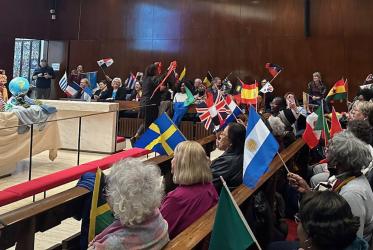By Walt Wiltschek (*)
Rev. Kjell Magne Bondevik knows all about making public statements. As former prime minister of Norway and a national legislator for more than 30 years, he often spoke on behalf of his government.
Now moderator of the World Council of Churches' Commission of the Churches on International Affairs (CCIA), he wants to see the public statements of the religious body carry a distinctly religious tone.
"The church must not act like another NGO (non-governmental organization)", Bondevik says. "We have value when we make public statements as a church, but we must always try to root our statements in these (Christian) values.
"It is out of my experience as a politician for many years", explains Bondevik, who served as prime minister from 1997 to 2000 and again from 2001 to 2005. "I have seen this from the political side, receiving so many statements from churches. I appreciated getting these statements, but we asked, 'Why are they saying this as a church? These could have been made by any group' ".
An ordained Lutheran minister himself, he sometimes found himself having to explain to government colleagues why the churches would be engaged in a certain issue.
Thus in a plenary session during this month's central committee meetings, he applauded the two most recently proposed WCC public issues statements for "being grounded in scripture".
For the WCC, that rooting is part of the job of Rev. Elenora Giddings Ivory, director of the programme on Public Witness: Addressing Power and Affirming Peace. Giddings Ivory works closely with the Central Committee's Public Issues Committee, which drafts WCC statements on a wide variety of current global issues.
At these current central committee meetings, for instance, statements on democratic electoral processes, Kenya, Pakistan, and eco-justice and ecological debt are among those being considered. It is a way to raise awareness, express solidarity, or urge the churches and others to action.
"We try to remember our biblical and theological mandate, to stand with those who are victims of oppression or poverty or violence (from) our understanding of where our individual faith traditions might say we should be, but more importantly where Jesus said we should be", Giddings Ivory says.
Finding consensus on the words and specific scriptural grounding to express those beliefs can sometimes be challenging, though - especially when working with a body that has 349 diverse church members.
Giddings Ivory cites as an example the death penalty, where one person may quote the Old Testament passage of "an eye for an eye", while another points out that Jesus superseded that principle in the Sermon on the Mount, advising instead to "turn the other cheek".
"Sometimes people can pick and choose what they want from the Bible", she says. Ultimately, however, she believes that intent speaks much louder than any words chosen. Jesus' commandment to "Love your neighbour as yourself", for example, sounded far different to her while standing in the violence-ravaged fields of Kenya, as she did recently on a WCC ecumenical solidarity team visit to that country.
Giddings Ivory likes to quote Amos 5:15, which calls on the people to "establish justice at the gate". Sometimes, she says, that justice is in the halls of government; other times it may be on Wall Street, in corporate boardrooms, or elsewhere.
Bondevik has heard that voice of justice in the halls of government. Wherever it is raised, he hopes that it continues to bear the words of scripture.
"The church voice is wanted", Bondevik says, "but if it is to be heard it must do what I said (rooting statements in scripture), or else it will only be one of many others and may not be heard at all".
(*) Walt Wiltschek is an ordained minister in the Church of the Brethren (US) and editor of its denominational magazine, Messenger. He lives in St. Charles, Illinois, in the United States.
Full text of the report on public issues
More information on the 13-20 February 2008 central committee meeting







